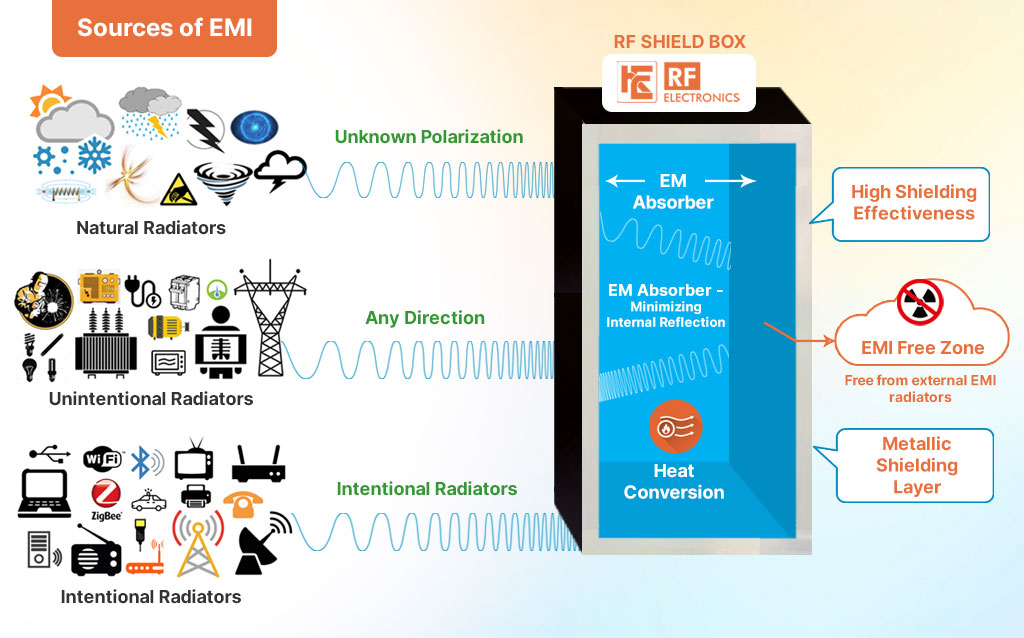
In today's interconnected world, where wireless communication reigns supreme and electronic devices permeate every aspect of our lives, ensuring reliable performance has become paramount. One crucial factor in achieving this reliability is RF isolation, also known as RF shielding effectiveness. In this blog, we'll delve into what RF isolation entails, explore the factors that affect its effectiveness, and understand its significance in ensuring the optimal performance of electronic devices.
What is RF Isolation (RF Shielding Effectiveness)?
RF isolation, or RF shielding effectiveness, refers to the ability of a shield or enclosure to block electromagnetic signals, particularly radio frequency (RF) signals, from interfering with electronic devices or systems. This shielding is crucial in environments where electromagnetic interference (EMI) can disrupt the operation of sensitive electronics, such as in medical equipment, telecommunications infrastructure, or industrial control systems. At its core, RF isolation involves containing electromagnetic emissions within a shielded enclosure, preventing them from radiating outward and interfering with nearby devices or receiving unwanted signals. This shielding can take various forms, including conductive enclosures, metallic shields, or specialized coatings designed to absorb or reflect RF energy.
Factors Affecting RF Shielding Effectiveness
Several factors influence the effectiveness of RF shielding, each playing a crucial role in determining the degree of isolation achieved:
- Material Selection: The choice of materials used in constructing the shield or enclosure significantly impacts its ability to block RF signals. Metals such as aluminum, copper, or steel are commonly employed due to their excellent conductivity and ability to attenuate electromagnetic fields effectively.
- Shield Design: The design of the shield or enclosure, including its geometry, seams, and openings, can affect its shielding effectiveness. Proper design considerations, such as minimizing gaps and utilizing conductive gaskets or seals, are essential to prevent leakage of RF signals.
- Frequency Range: Different shielding materials and designs exhibit varying degrees of effectiveness across different frequency ranges. Understanding the frequency spectrum of the electromagnetic signals of concern is crucial in selecting the most appropriate shielding solution.
- Thickness and Coating: The thickness of the shielding material and the presence of specialized coatings can enhance its ability to attenuate RF signals. Thicker materials offer greater attenuation, while coatings such as conductive paints or films provide additional protection against EMI.
- Environmental Conditions: Environmental factors, such as temperature variations, humidity levels, and exposure to corrosive substances, can impact the long-term performance of RF shielding materials. Proper maintenance and periodic inspections are necessary to ensure continued effectiveness.
- Electromagnetic Compatibility (EMC) Requirements: Compliance with regulatory standards and EMC requirements is essential in many industries to ensure the proper functioning of electronic devices and mitigate interference risks. RF shielding plays a critical role in meeting these requirements and obtaining certification.
Significance of RF Isolation in Electronics Performance
The significance of RF isolation in electronics performance cannot be overstated, particularly in applications where signal integrity and reliability are paramount. Here are some key reasons why RF isolation is crucial:
- Prevention of Interference: RF isolation shields sensitive electronic components from external RF interference, ensuring that devices operate without disruption or degradation of performance. This is especially critical in environments with high levels of electromagnetic noise, such as urban areas or industrial facilities.
- Signal Integrity: By minimizing the impact of external RF signals, RF isolation helps preserve the integrity of transmitted and received signals within electronic systems. This is essential in applications such as wireless communication, where even slight interference can result in data loss or transmission errors.
- Compliance with Regulatory Standards: Many industries, including telecommunications, aerospace, and medical devices, are subject to stringent regulatory standards regarding electromagnetic compatibility and interference mitigation. RF isolation is essential for achieving compliance with these standards and obtaining necessary certifications.
- Protection of Sensitive Equipment: In environments where sensitive electronic equipment is deployed, such as hospitals, research laboratories, or military installations, RF isolation provides essential protection against external interference sources. This ensures the reliable operation of critical systems and prevents potentially hazardous malfunctions.
- Enhanced Product Reliability: Incorporating robust RF isolation measures during the design and manufacturing stages of electronic devices contributes to overall product reliability and longevity. Devices that are immune to external RF interference are less likely to experience failures or malfunctions, resulting in higher customer satisfaction and reduced maintenance costs.
In conclusion, RF isolation plays a pivotal role in ensuring the reliable performance of electronic devices in today's interconnected world. Understanding the factors that influence RF shielding effectiveness and implementing appropriate shielding measures are essential steps in achieving optimal electronics performance in diverse applications.
At RF Electronics, we specialize in providing high-quality RF chambers, RF shield boxes, and other essential testing solutions. Our commitment to innovation and quality allows us to support industries such as telecommunications, automotive, and consumer electronics in meeting their RF testing and isolation requirements with precision and efficiency.


